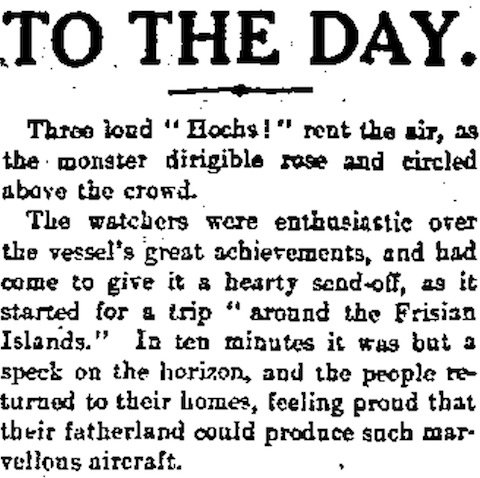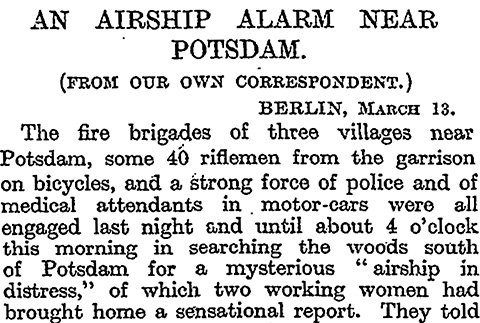
Phantom airships attract relatively little attention in the press today. For the first time in more than a week there are no new sightings to report. Stale (and slightly garbled) news about the Grimsby box kite and the City of Leeds and Othello sightings appear in the Aberdeen Daily Journal and the Western Gazette, while the Manchester Courier once again republishes old content for the benefit of the tiny proportion of its readers who haven’t yet read about Captain Lundie’s encounter with a dark airship near Grimsby. At least a leading article in the Standard is original in its phrasing, if not in its content. It attacks what it calls ‘The anti-defence crusade’ of Radicals, for whom ‘it really seems as if the mere mention of national defence in any form [is] a source of annoyance and irritation’ (p. 8). One important ‘Ministerial’ newspaper ‘talks about “the jingoes of the air” and sneers at the “new and attractive theme” which the aerial peril has provided for them (p. 8).
It has been the cue of these critics all through to maintain that the airship ‘scare’ was all nonsense, though the hasty publication of the Home Secretary’s schedule is a significant testimony to its reality. How many foreign aircraft have passed over these islands during the past few months is doubtful; but that some have been taking a look round at our strategic bases is very well known to the Admiralty.
The Standard, of course, slips in another attack on the new aerial navigation regulations on the basis that there is currently no means of enforcing them. This is also the theme of a leading article, entitled ‘The Flying Dutchmen’, in the Irish Independent, which paraphrases (sympathetically, though stopping short of endorsement) the argument of ‘a section of the English Press’ that the regulations are ‘absolutely useless if intended for the protection of Great Britain’ (p. 4). Among its sources may be the Daily Express, for like that paper it misunderstands the regulations in thinking that they ‘only become operative if the airship lands at any of the prohibited areas of British territory’:
Thus, if the German airships are really spying out the land the regulations can have no effect unless in case of accident to one of their airships which would compel a landing.
Hence the demand of ‘a million sterling for the immediate expansion of the British air fleet’.
Today’s ‘In the Street’ column of the Dover Express has a number of similar criticisms of the regulations (p. 5). ‘In the Street’ appears to be a forum for anonymous opinion and gossip, with each item written in the form ‘THEY SAY…’ Thus:
THEY SAY that Mr. McNeill need not have been alarmed at our aerial inferiority now that the Government have issued a notice that trespassers will be prosecuted!
THEY SAY it will no longer be necessary to have a sentry on the Sea Front.
THEY SAY that the danger of aircraft coming unexpectedly to England would be in war time, not peace time, and if they came in war and found us protected with comprehensive regulations only, they would not care a tinker’s cuss about them.
THEY SAY that after the issue of the airship regulations we shall expect to see notices posted up that if any foreign warships bombard Dover Castle a fine of ten shillings and costs will be imposed.
While these are similar to the standard conservative attacks on the regulations, an editorial comment elsewhere in the same issue reveals that the Dover Express has a somewhat different agenda to other critics. Dover, being the closest point to the Continent, is currently the natural landing place for aeroplanes crossing the Channel; and yet (p. 2)
The new regulations prevent aeroplanes from approaching within three miles of Dover. Only Army and Navy men will be allowed to fly at the Dover Aviation Ground at the top of Whitfield Hill, and foreign fliers cannot approach Dover, although their bona fides may be above criticism. No longer will a Bleriot be allowed to make a Channel crossing that will be historic, supposing that a new type of machine were invented.
The Dover Express even argues, in complete contradiction to most other opponents of the regulations, that aircraft have not yet proved their utility in war: ‘Anyone who has the most elementary knowledge of air-craft knows […] That it is impossible for airships, much less aeroplanes, to damage anything seriously in their present development’. And why ‘such a panic about nothing’?
Because of foolish rumours which originated from people who saw kites with lanterns attached, and whose tales were so vague that it was solemnly suggested that they might have seen the planet Venus!
The paper is actually somewhat sceptical of the astronomical explanation for scareships, if ‘On the Street’ is any guide (p. 5):
THEY SAY that if any readers of the ‘Daily Chronicle’ adopt its advice and try to watch Venus travelling in the sky from West to East they will have to wait a long time.
THEY SAY that during their waiting period they may see a real air-ship.
The Dover Express has a different theory in mind for the Dover incident two months ago, ‘when a motor boat’s exhaust explosions were mistaken for those of an airship’ (p. 2).
There is an interesting revelation in the Western Gazette today. Thus far no government minister has made any sort of comment on the phantom airships, apart from some parliamentary answers to questions regarding the Sheerness visitor. But now H. H. Asquith himself has gone on the record (p. 12):
The Prime Minister, in a letter to Captain Faber, says that in his opinion too much importance has been attached to the recent stories of the visits of mysterious airships to our shores, but adds that the whole question of aerial defence is receiving the most careful consideration.
The context here is an offer made by Faber, a Conservative MP, ‘to give an aeroplane to the nation’ and a ‘proposal that every county shall provide a similar machine’, which will be considered at the next Committee of Imperial Defence meeting.
Another interesting turn is the claim made by the Aberdeen Daily Journal‘s anonymous correspondent from Stoneywood that the scareships seen there recently were not just engaged in espionage, but sabotage as well! (p. 6)
Nothing ever brought our district to a higher pitch of excitement than the supposed appearance recently of a nocturnal visitor in the shape of a foreign airship. The purpose of the visit seems to have been detected, as several wires of the lofty erection at the Admiralty wireless station have been torn away. It is reported that Sclattie Quarry will be permanently manned overnight for observation purposes by a detachment of local Territorials.
Oddly, no reference is made to a story appearing in the same paper only yesterday which offered recent lighting storms as an explanation for the airships seen nearby, and argued that an airship would be unlikely to be flying in such hurricane conditions. It seems like these same weather conditions could easily account for damage to a wireless station, but perhaps that is ruled out by information not appearing in this admittedly brief report.
Finally, the Daily Express has a special treat for its readers: a fictionalised account of the Sheerness incident — as told from the perspective of the German airship crew, of course. Here it is in its entirety (p. 4; above):
TO THE DAY.
Three loud ‘Hochs!’ rent the air, as the monster dirigible rose and circled above the crowd.
The watchers were enthusiastic over the vessel’s great achievements, and had come to give it a hearty send-off, as it started for a trip ‘around the Frisian Islands.’ In ten minutes it was but a speck on the horizon, and the people returned to their homes, feeling proud that their fatherland could produce such marvellous aircraft.
‘Very cold to-night, sir,’ said the lieutenant to the chief, as the dirigible sped westward. The commander nodded an assent, and gave an order to one of the crew. Three officers and a crew of nine formed the complement of this great cruiser, and each had implicit confidence in the intricate mechanism under their control.
Heligoland was now beneath them, and an order was given to the helmsman. The airship swung round, and took a course almost south-westerly over the North Sea.
‘It is now 350 miles to Sheerness,’ grunted the chief to his officers; ‘a ten hours’ journey at this rate of sailing.’ Three thousand feet below the sea heaved and tossed, while a few miles to port was a French destroyer under way.
Night was now coming on; but still the propellers drove the vessel towards the English coast. A stiff breeze had to be contended with, but it would be all the better for the return journey.
‘These English are brave people,’ said the commander, ‘but they are too confident. They trust too much in their isolated position.’ ‘And on their past reputation,’ added a lieutenant.
This seemed a long journey, but now, far below, the lightships flashed their warnings to seamen. Here was the Swin light vessel, there the Mouse lightship.
‘Here’s the Nore, sir,’ said the first lieutenant.
‘Good!’ ejaculated the chief, and fumbling about in the small cupboard before him, he withdrew a small bottle of wine. He handed a glass each to his brother officers, and filled them to the brim.
Sheerness was now below, and for a few seconds only, above the whirr of the propellers, the faint strains of ‘God Save the King,’ played in a warship, reached their ears.
A cruel smile curled around the lips of the chief as he spoke:–
‘Meine Herren, zum Tag!‘
They drank the toast in silence, and replaced the glasses in the cupboard.
Then the great airship turned and headed for the North Sea.
‘Gentlemen, to the Day!’ — der Tag, the day every German dreams of, the day that will end with Prussian grenadiers marching down Whitehall! The invasion of Britain and the destruction of the British Empire! Oh, when will people realise etc.
![]() This work is licensed under a Creative Commons Attribution-NonCommercial-NoDerivatives 4.0 International License.
Permissions beyond the scope of this license may be available at http://airminded.org/copyright/.
This work is licensed under a Creative Commons Attribution-NonCommercial-NoDerivatives 4.0 International License.
Permissions beyond the scope of this license may be available at http://airminded.org/copyright/.




